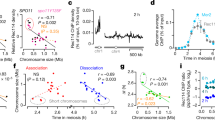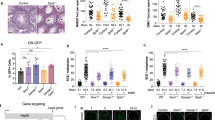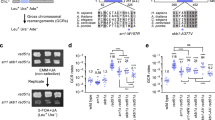Abstract
Growth and development are dependent on the faithful duplication of cells. Duplication requires accurate genome replication, the repair of any DNA damage, and the precise segregation of chromosomes at mitosis; molecular checkpoints ensure the proper progression and fidelity of each stage. Loss of any of these highly conserved functions may result in genetic instability and proneness to cancer. Here we show that highly significant increases in chromosome missegregation occur in cell lines lacking the RAD51-like genes XRCC2 and XRCC3. This increased missegregation is associated with fragmentation of the centrosome, a component of the mitotic spindle, and not with loss of the spindle checkpoint. Our results show that unresolved DNA damage triggers this instability, and that XRCC2 and XRCC3 are potential tumour-suppressor genes in mammals.
This is a preview of subscription content, access via your institution
Access options
Subscribe to this journal
Receive 12 print issues and online access
$209.00 per year
only $17.42 per issue
Buy this article
- Purchase on Springer Link
- Instant access to full article PDF
Prices may be subject to local taxes which are calculated during checkout



Similar content being viewed by others
References
Lengauer, C., Kinzler, K. W. & Vogelstein, B. Nature 386, 623–627 (1997).
Duesberg, P., Rausch, C., Rasnick, D. & Hehlmann, R. Proc. Natl Acad. Sci. USA 95, 13692–13697 (1998).
Baumann, P. & West, S. C. Trends Biochem. Sci. 23, 247–251 (1998).
Thacker, J. Trends Genet. 15, 166–168 (1999).
Johnson, R. D., Liu, N. & Jasin, M. Nature 401, 397–399 (1999).
Pierce, A. J., Johnson, R. D., Thompson, L. H. & Jasin, M. Genes Dev. 13, 2633–2638 (1999).
Tambini, C. E. et al. Genomics 41, 84–92 (1997).
Liu, N. et al. Mol. Cell 1, 783–793 (1998).
Cartwright, R., Tambini, C. E., Simpson, P. J. & Thacker, J. Nucleic Acids Res. 26, 3084–3089 (1998).
Fatyol, K., Cserpan, I., Praznovszky, T., Kereso, J. & Hadlaczky, G. Nucleic Acids Res. 22, 3728–3736 (1994).
Faravelli, M. et al. Cytogenet. Cell Genet. 83, 281–286 (1998).
Thacker, J. Biochimie 81, 77–85 (1999).
Jeggo, P. A. Adv. Genet. 38, 185–218 (1998).
Amon, A. Curr. Opin. Genet. Dev. 9, 69–75 (1999).
Taylor, S. S. & McKeon, F. Cell 89, 727–735 (1997).
Stearns, T., Evans, L. & Kirschner, M. Cell 65, 825–836 (1991).
Campbell, M. J. & Davis, R. W. J. Mol. Biol. 286, 417–435 (1999).
Bishop, D. K. et al. J. Biol. Chem. 273, 21482–21488 (1998).
Xu, X. et al. Mol. Cell. 3, 389–395 (1999).
Tutt, A. et al. Curr. Biol. 9, 1107–1110 (1999).
Venkitaraman, A. R. Science 286, 1100–1102 (1999).
Moynahan, M. E., Chiu, J. W., Koller, B. H. & Jasin, M. Mol. Cell 4, 511–518 (1999).
Hsu, L. C. & White, R. L. Proc. Natl Acad. Sci. USA 95, 12983–12988 (1998).
Sibon, O. C., Kelkar, A., Lemstra, W. & Theurkauf, W. E. Nature Cell Biol. 2, 90–95 (2000).
Cox, M. M. et al. Nature 404, 37–41 (2000).
Zimmerman, W., Sparks, C. A. & Doxsey, S. J. Curr. Opin. Cell Biol. 11, 122–128 (1999).
Fry, A. M., Meraldi, P. & Nigg, E. A. EMBO J. 17, 470–481 (1998).
Pihan, G. A. et al. Cancer Res. 58, 3974–3985 (1998).
Lingle, W. L. & Salisbury, J. L. Am. J. Pathol. 155, 1941–1951 (1999).
Savage, J. R. J. Med. Genet. 13, 103–122 (1976).
Acknowledgements
We thank A. George, C. Tambini and S. Townsend for technical support, D. Papworth for statistical analysis, J. Savage for discussion, and T. Humphrey for comments on the manuscript. This work was supported by the European Commission (contract F14P-CT950010).
Author information
Authors and Affiliations
Corresponding author
Rights and permissions
About this article
Cite this article
Griffin, C., Simpson, P., Wilson, C. et al. Mammalian recombination-repair genes XRCC2 and XRCC3 promote correct chromosome segregation. Nat Cell Biol 2, 757–761 (2000). https://doi.org/10.1038/35036399
Received:
Revised:
Accepted:
Published:
Issue Date:
DOI: https://doi.org/10.1038/35036399
This article is cited by
-
Association between RAD51, XRCC2 and XRCC3 gene polymorphisms and risk of ovarian cancer: a case control and an in silico study
Molecular Biology Reports (2021)
-
Haplotype analysis of XRCC2 gene polymorphisms and association with increased risk of head and neck cancer
Scientific Reports (2017)
-
Association of XPD (Lys751Gln) and XRCC1 (Arg280His) gene polymorphisms in myelodysplastic syndrome
Annals of Hematology (2016)
-
Association between XRCC3 T241M polymorphism and glioma risk: a meta-analysis
Tumor Biology (2014)
-
XRCC3 Thr241Met polymorphism and ovarian cancer risk: a meta-analysis
Tumor Biology (2014)



